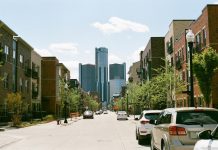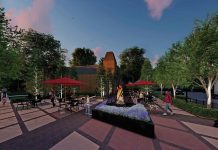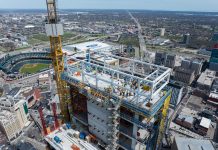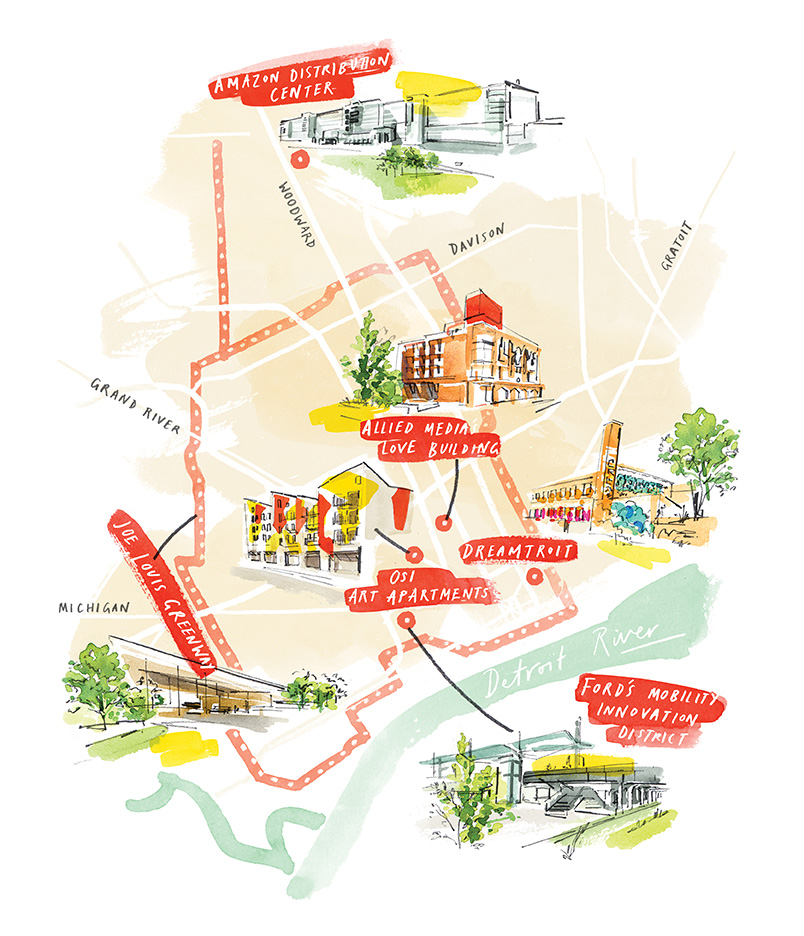
Another year, another litany of new construction projects coming to fruition. For a city that, not long ago, was a development inertia wasteland, Detroit is now such a busy place for construction that it’s impossible to keep up with all of it — or when it’s supposed to be done. That’s what we’re here for! Here are six of the most interesting (to us!) Detroit development projects expected to open in 2022.
Joe Louis Greenway
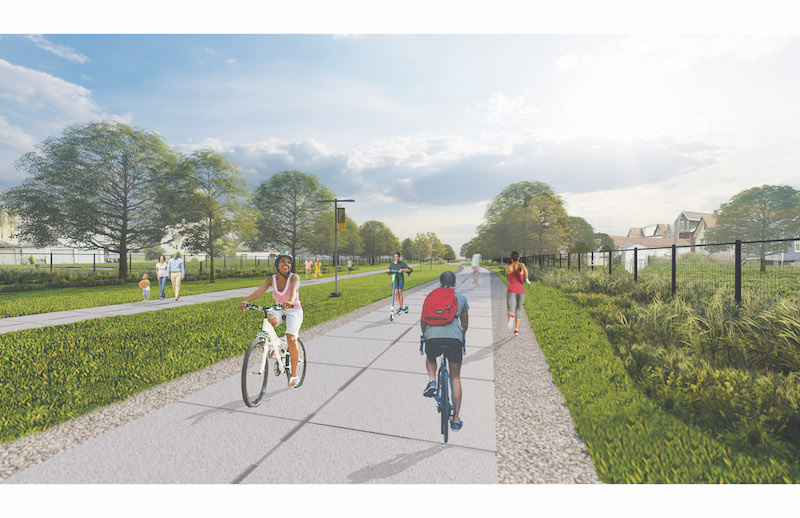
What it is: A planned 27.5-mile biking and hiking loop around metro Detroit, starting at the Detroit Riverfront and passing through Dearborn, Hamtramck, and Highland Park. A mere idea in 2007, it will begin to take official shape this year.
What opens in 2022: By fall, three pieces of the JLG are expected to be accessible to the public: a half-mile segment between Tireman Avenue and Joy Road, in Detroit that includes landscaping and stormwater management, which is half the planned segment between Joy and Warren roads that is expected to be done in 2023; a 1.6-mile segment of Joseph Campau Avenue between Carpenter Avenue and Hamtramck Drive in Hamtramck; and the Southwest Greenway, a below-grade 0.67-mile path stretching from Bagley Street to Jefferson Avenue to connect Corktown to the West Riverfront. Eventually, that segment will terminate in Wilson Centennial Park, which won’t open until 2024.
What they’re saying: “This is popping out in multiple spots this year,” says JLG Project Manager Christina Peltier. “As more pieces come online each year, it’ll start to connect.”
Price: Overall, the JLG will cost as much as $210 million. The full Warren-Joy segment will cost $14 million, the Southwest Greenway is a $6 million project, and the Hamtramck bike lanes came in at about $409,000.
Ford’s Mobility Innovation District
What it is: A “walkable” 30-acre Corktown campus anchored by the renovated, iconic Michigan Central Station that will serve as the legendary automaker’s hub for research and development for a range of new mobility products, from self-driving cars to non-gas vehicles. In all, the district will offer more than 1 million square feet of commercial space and host some 5,000 workers.
When: Two buildings — the Book Depository and the Bagley Mobility Hub — are expected to be open by summer. The Book Depository is an Albert Kahn structure, originally used as a post office and then as the school district’s books warehouse but which has been vacant since a 1987 fire. It stands adjacent to the defunct train depot and, after renovation, will boast shared workspaces, a rooftop lounge, a library, and formal meeting rooms. The six-story, 440,000-square-foot parking hub, at the corner of Bagley and Wabash streets, will have space for 1,253 cars and an autonomous vehicle testing area and e-bike and e-scooter stations.
What they’re saying: “The Book Depository is going to be the heart of the innovation district, a mixed-use makerspace for partners to come in and solve problems,” Mary Culler, now president of the Ford Motor Co. Fund, tells the Associated Press. “This project is really pivotal for Ford and the city.”
Price: $740 million for completion of the entire complex. The Bagley Mobility Hub will cost $44.9 million; the automaker has not broken out the cost of the Book Depository renovation. Ford is expected to tap some $250 million in tax incentives from federal, state, and city sources to offset the cost.
Love Building
What it is: A 25,000-square-foot Core City reconstruction, at Grand River Avenue and 15th Street, of a notoriously muralcoated 100-year-old building that was long an artist colony. It was bought for $1 million by the international social justice nonprofit Allied Media Projects, and when finished, the four-story Love Building — so named because the word was spelled out in sign language across the old structure, in one of the murals — will include office space for a quintet of Detroit nonprofits, a deli counter and cafe, a multipurpose community room, a pocket park, and an amphitheater.
When: Move-in expected July 2022. The project was originally slated for completion in September 2021 but was delayed by supply chain woes.
What they’re saying: “We envisioned a building that’s a hub for social justice organizing and organizations that share a common core of values,” Jenny Lee, co-executive director for Allied Media Projects, tells Model D.
Price: $12.8 million
Dreamtroit
What it is: A mixed-use development with 81 apartments, as well as 38,000 square feet of commercial space, in the Northwest Goldberg neighborhood. It stands on the site of a storied car factory, built in 1908, which once rolled out Ford Model Ts. The building, in recent years, has housed Recycling Here, which will remain in the complex, along with a coffee shop, a smoothie bar an event space, and an expansion of the Lincoln Street Art Park. Of the 81 units, 58 will be available to people at various ranges of income below the area median — with a preference given to artists interested in establishing “live-make” spaces.
When: The plan is to start offering residential leases in August and be fully open by October.
What they’re saying: “Everybody stepped up. This is a passion project for not only the owners, but also the general contractor, the architect, everyone,” says developer Matthew Naimi, who also had a brain tumor removed in 2021.
Price: $24.6 million, including $2.26 million from the Detroit Housing for the Future Fund. The original cost, about $20 million, has risen due to supply chain challenges and additional work required, as discovered amid construction, Naimi says.
Osi Art Apartments
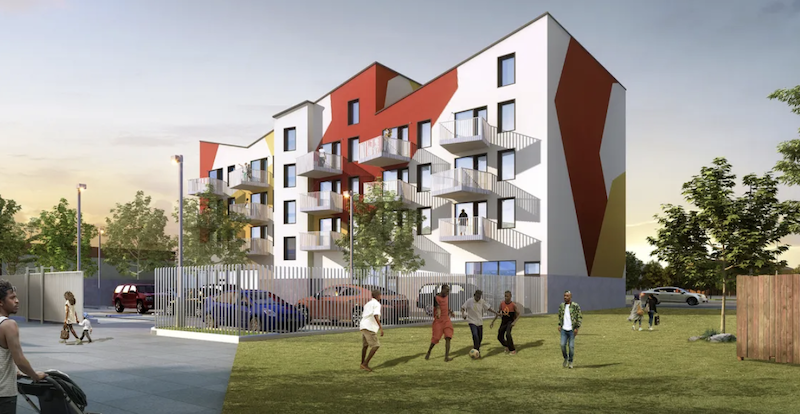
What it is: A colorful, four-story, 30-unit housing complex at 3820 Grand River Ave., in Woodbridge, where half the units are set aside for people with household incomes of less than $60,000. The Osi also will boast 5,000 square feet of rentable commercial space. It’s part of the West End Gallery District, a collection of art galleries, retail, restaurants, bars, and mixed-use housing developments. It was previously a partially demolished building.
When: Scheduled for completion by end of 2022.
What they’re saying: “We like to think we have been a very positive sign of impact ion Woodbridge, with others pushing for redevelopment opportunities since our project was announced and gained momentum,” says co-developer Roderick Hardamon, CEO of Urge Development Group.
Price: About $7 million, which includes a $470,000 investment and $4.2 million in financing from the Detroit Housing for the Future Fund.
Former Michigan State Fairgrounds
What it is: 142 acres, of which 78 are now leased to online shopping behemoth Amazon, for a 4 million-square-foot distribution center that will employ some 1,200 workers.
When: Expected to open in July.
What they’re saying: “This development schedule — in under two years — is exactly what was envisioned when we started,” Luke Polcyn, an economic adviser to the mayor, tells Hour Detroit. “So it’s very exciting.”
Price: $400 million, none of which is covered by any tax incentives or public money.
This story is featured in the January 2022 issue of Hour Detroit magazine. Read more stories in our digital edition.
|
|
|



